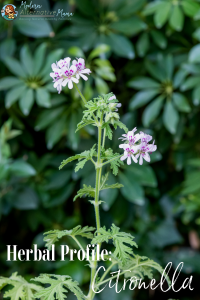By Sarena-Rae Santos, Natural Health Blogger
What is Citronella
The citronella plant, sometimes called the mosquito plant, or its botanical name Cymbopogon winterianus, grows between 2 and 3 feet. Citronella plants can be identified by their grass-green colored lacy-looking leaves attached to slender branches that grow on a central stem. Each plant has multiple stems and blooms small flowers with light pink or lavender petals (1). Citronella is best known for deterring bugs, like mosquitos, but citronella is so much more than its insecticidal properties.
Health Benefits of Citronella
Medicinally speaking, citronella leaves are crushed, and the oil is rubbed on the skin for its many health benefits. The oil from the leaves can also be turned into an essential oil. Some of citronella’s health benefits include:
Antioxidant Properties
Antioxidants can help fight damage from harmful free radicals. The buildup of free radicals has been linked to chronic diseases, such as cancer and heart disease (2). A study review analyzed 34 different citrus essential oils and their components for radical-scavenging activities. The review demonstrated citronella, amongst other citrus volatile components, had high antioxidant capabilities for fighting free radicals that can cause disease and cellular damage (3).
Antifungal Properties
An antifungal property is when a substance, or in this case, an herb, can fight the growth of specific pathogens that could harm your health, such as ringworm, athlete’s foot, tinea versicolor, toenail fungus, and jock itch (4). One study found citronella oil could destroy the Aspergillus niger (black mold) cell wall, killing organisms within the cell that can cause lung and sinus infections (5).
Antibacterial Properties
An antibacterial property is when a substance, or in this case, an herb, can destroy or suppress the growth and reproduction of bacteria (6). An early study analyzed citronella’s antifungal and antibacterial activity and found that citronella oil was effective against all 12 fungi that were tested. Citronella oil also inhibited 15 of the 22 bacteria tested (7).
Wound-Healing Properties
Wound-healing properties are the complex and dynamic process of restoring tissue structure in damaged tissue as closely as possible to its normal state (8). Animal studies have found citronella oil has healing effects on candida-infected wounds in diabetic mice. Not only did the study find citronella to have wound-healing properties, but researchers also noted anti-inflammatory properties and further confirmed its antifungal properties, all contributing to its wound-healing effects (9).
Insecticidal Properties
An insecticidal property is when a substance, or in this case, an herb, can kill, harm, repel or mitigate one or more species of insects (10). A study review found that combining citronella oil and vanillin provided mosquito protection for up to three hours (11). Another study found citronella alone only provided 57% insect protection (12). These results explain why most natural bug repellants contain several essential oils for maximum insecticidal effects.
The plant alone does not have insecticidal properties; the oils in the leaves provide this benefit (13).
May Aid in Weight Loss
Weight management is a challenge for most people in the U.S., with more than 70% of American adults being overweight (14). Excess body weight is a common contributor to type 2 diabetes, the most common type of diabetes. Being overweight increases your risk for type 2 diabetes, heart disease, and stroke (15). One study demonstrated that inhalation can decrease feeding, lower cholesterol, and slow weight gain (16).
Safety Concerns
The mainstream cautions against using citronella oil while pregnant or breastfeeding because there isn’t enough reliable information to know if citronella oil is safe. These sources also claim when applied to the skin, some may experience reactions or irritation, and the inhalation of citronella oil is likely unsafe. They claim lung damage has been reported but did not provide proof of this claim (17).
So, of course, with such an accusation, I felt inclined to dive deep into citronella’s potential to cause lung damage. I would never recommend something I knew could harm others. To no one’s surprise, my research was the opposite of the mainstream’s narrative. Instead, I found a study demonstrating citronella oil’s anti-inflammatory and lung-protective properties in Lipopolysaccharide (LPS)-induced acute lung injury in mice (18).
Now that we’ve debunked the mainstream narrative let’s discuss using citronella essential oil safely.
Trusted aromatherapist Wendy Robbins cautions never to use any essential oils internally or undiluted. She also warns citronella essential oil has a risk of drug interactions. Additionally, she recommends a dermal maximum of 18.2% (19).
How to Use Citronella
Citronella is most often used in the form of essential oil. I recommend Plant Therapy’s Citronella Essential Oil, which is safe for pregnancy, breastfeeding, kids, dogs, and horses. If you’re a DIY person, some great starter recipes are:
Follow the recommendations for each product; some of my recommendations include the following:
- Earthley’s Pest Aside is the natural and effective way to prevent bug bites! Our essential oil blend repels bugs to ward off those itchy, annoying bites so you can enjoy the great outdoors. This salve comes in a convenient tube, so it’s perfect for taking on the go for a mess-free application.
- Murphy’s Naturals Mosquito Repellent Candle is a soy and beeswax blend candle featuring a citrusy blend of rosemary, peppermint, and lemongrass oils that smell great while allowing you to sit back and relax bite free for up to 30 hours.
- Plant Therapy’s Citronella Essential Oil is steam distilled from the leaves of the Citronella plant to produce a high-quality essential oil.
- Plant Therapy’s Organic Citronella Essential Oil is steam distilled from the leaves of the Citronella grass (Cymbopogon winterianus) to produce a high-quality essential oil that’s USDA Certified Organic with absolutely no additives or fillers.


